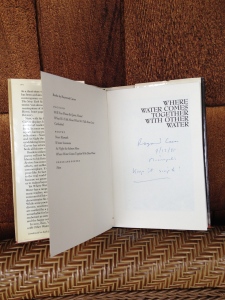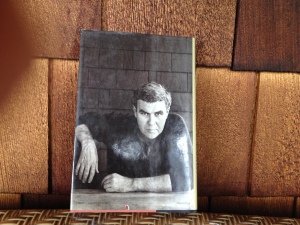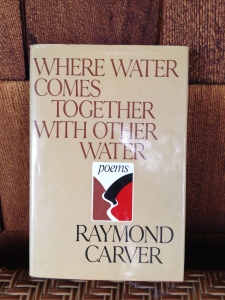I fell in love with Raymond Carver’s poems and short stories during the 1980’s, just as people fall in love with each other.
His words are woven into that decade of my life, a challenging time where I found sobriety and set out on my own to open a law office as a young lawyer. Both my parents were dead, and now I dreamed of finding love, happiness, and starting my own family. What I got instead were divorce clients and the fellowship of AA. Not to minimize those– they saved my life— but I suffered years of loneliness when I came home alone from the office or gatherings with friends.
The spare, haunting words of Raymond Carver became my heart’s companions. He wrote stories and poems of loss and sadness in the lives of ordinary and down-and-out people. He understood my deepest unspoken longings and brokenness.
I knew he lost his family due to his drinking, but through it all, Carver found his great gift of creative writing, and at age 40, he also found sobriety. He achieved some fame and awards, and is well-known for revolutionizing the short story. Then he found the love of his life, poet Tess Gallagher. For me, a newly sober young lawyer with a childhood devastated by my father’s alcoholism, Carver carried a story of hope out of the wreckage.
Then—after finding success, sobriety and Tess, Carver found out he had widespread cancer with just months to live. He died right after turning 50, same as my dad. The difference between them is that Raymond Carver died fulfilled. He and Tess were married just weeks before he died, and he did not seem the least bit bitter about his fate, which made me admire him even more.
My father, a talented and successful trial lawyer in the late 50’s and early 60’s, never could stay sober. He was involuntarily committed for treatment a dozen times and it never took. He lost everything and died alone. Somewhere along the way I adopted Raymond Carver not only as my favorite writer but as a father figure and beacon of hope that I, too, might find my true love and creative expression, despite the tragedy in my family.
I had the unforgettable joy of meeting Raymond Carver for about a minute in 1985, during his time of sobriety and before his fatal cancer diagnosis. My brother Mick, his fiancée Mary and I went to his reading here in the Twin Cities, and I was excited as anyone could be, seeing their personal hero. We got just one signed hardcover copy of Where Water Comes Together with Other Water to share between us, because we were on tight budgets, just starting out. We technically still share “joint custody” of the book, though I have had it all these years in plain view on my bookshelf, thanks to my brother’s generosity.
After the reading, I wanted to tell Carver how much his writing meant to me. It was impossible to put into words. Also, I had a couple years of sobriety too, and wanted to tell Raymond Carver this! When it was my turn at the signing table, star-struck and trembling, I told him that I, too, recently found sobriety. I asked him to inscribe the book with “Keep it Simple” —a slogan from AA. Then I mumbled something about the slogan perhaps also being able to refer to his unique writing style, which is why I chose it for the inscription. Secretly, I thought I was rather clever to make that connection, and further thought that maybe he would be impressed by this insight. I cringed a bit right now remembering saying that to such a great writer.
Years after his death, I understood that he would never have referred to his own writing as simple. He called himself as a “precisionist”. (Of course, that’s it.) At the signing table, though, smiling, looking into my eyes with kindness, he said, “That’s great!” and he wrote exactly what I requested:
I noticed for the first time today as I took these photos, that the photograph of Carver on the back cover was taken in front of a wall of cedar shingles, same as those on the old screen porch where I now write, overlooking a small lake.
Water coming together with other water.
In honor of Raymond Carver today and of the power of writing to inspire, and at times rescue us, here are five of his poems, ones that I have held deep in my heart all of my adult life. As I assembled them, I realized they create a short, yet clear and powerful journey through his life. As I now face stage four cancer, I am inspired by Carver to practice his “attitude of gratitude”. Here’s hoping you can read these through in one sitting to get a glimpse of Carver’s life and writing in these beautiful, precise poems:
Fear
Fear of seeing a police car pull into the drive.
Fear of falling asleep at night.
Fear of not falling asleep.
Fear of the past rising up.
Fear of the present taking flight.
Fear of the telephone that rings in the dead of night.
Fear of electrical storms.
Fear of the cleaning woman who has a spot on her cheek!
Fear of dogs I’ve been told won’t bite.
Fear of anxiety!
Fear of having to identify the body of a dead friend.
Fear of running out of money.
Fear of having too much, though people will not believe this.
Fear of psychological profiles.
Fear of being late and fear of arriving before anyone else.
Fear of my children’s handwriting on envelopes.
Fear they’ll die before I do, and I’ll feel guilty.
Fear of having to live with my mother in her old age, and mine.
Fear of confusion.
Fear this day will end on an unhappy note.
Fear of waking up to find you gone.
Fear of not loving and fear of not loving enough.
Fear that what I love will prove lethal to those I love.
Fear of death.
Fear of living too long.
Fear of death.
I’ve said that.
Waiting
Left off the highway and
down the hill. At the
bottom, hang another left.
Keep bearing left. The road
will make a Y. Left again.
There’s a creek on the left.
Keep going. Just before
the road ends, there’ll be
another road. Take it
and no other. Otherwise,
your life will be ruined
forever. There’s a log house
with a shake roof, on the left.
It’s not that house. It’s
the next house, just over
a rise. The house
where trees are laden with
fruit. Where phlox, forsythia,
and marigold grow. It’s
the house where the woman
stands in the doorway
wearing the sun in her hair. The one
who’s been waiting
all this time.
The woman who loves you.
The one who can say,
“What’s kept you?”
What the Doctor Said
He said it doesn’t look good
he said it looks bad in fact real bad
he said I counted thirty-two of them on one lung before
I quit counting them
I said I’m glad I wouldn’t want to know
about any more being there than that
he said are you a religious man do you kneel down
in forest groves and let yourself ask for help
when you come to a waterfall
mist blowing against your face and arms
do you stop and ask for understanding at those moments
I said not yet but I intend to start today
he said I’m real sorry he said
I wish I had some other kind of news to give you
I said Amen and he said something else
I didn’t catch and not knowing what else to do
and not wanting him to have to repeat it
and me to have to fully digest it
I just looked at him
for a minute and he looked back it was then
I jumped up and shook hands with this man who’d just given me
something no one else on earth had ever given me
I may have even thanked him habit being so strong
Gravy
No other word will do. For that’s what it was.
Gravy.
Gravy, these past ten years.
Alive, sober, working, loving, and
being loved by a good woman. Eleven years
ago he was told he had six months to live
at the rate he was going. And he was going
nowhere but down. So he changed his ways
somehow. He quit drinking! And the rest?
After that it was all gravy, every minute
of it, up to and including when he was told about,
well, some things that were breaking down and
building up inside his head. “Don’t weep for me,”
he said to his friends. “I’m a lucky man.
I’ve had ten years longer than I or anyone
expected. Pure Gravy. And don’t forget it.”
Late Fragment
And did you get what
you wanted from this life, even so?
I did.
And what did you want?
To call myself beloved, to feel myself
beloved on the earth.
Raymond Carver, (1938-1988)
The poems Gravy and Late Fragment
are engraved on Raymond Carver’s tombstone.



